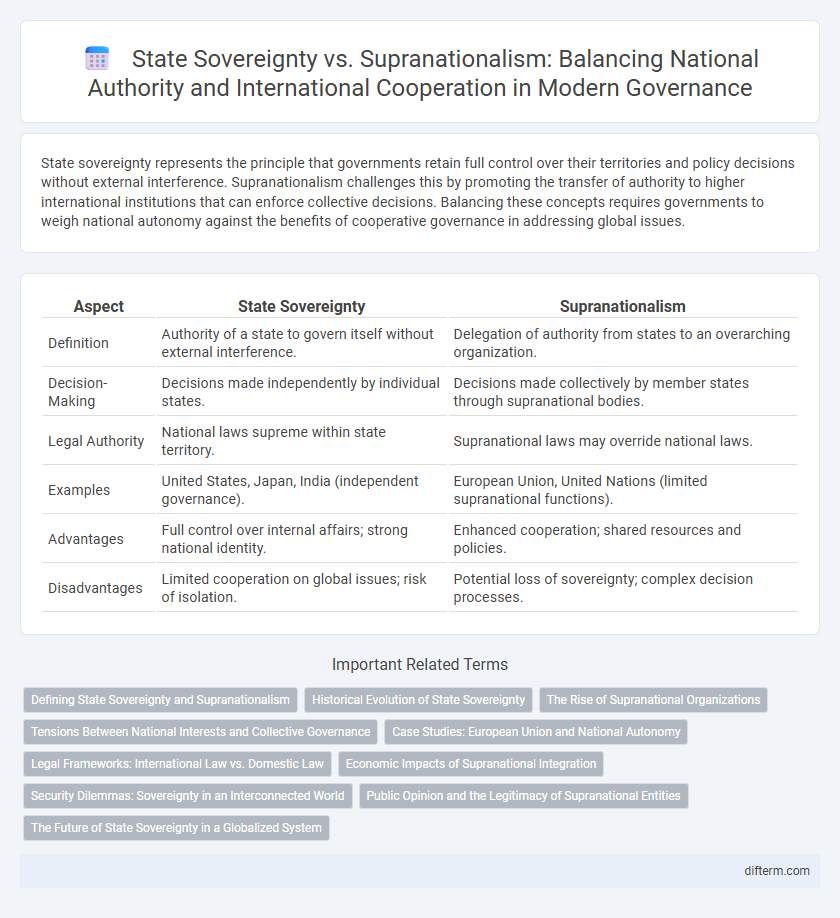State sovereignty represents the principle that governments retain full control over their territories and policy decisions without external interference. Supranationalism challenges this by promoting the transfer of authority to higher international institutions that can enforce collective decisions. Balancing these concepts requires governments to weigh national autonomy against the benefits of cooperative governance in addressing global issues.
Table of Comparison
| Aspect | State Sovereignty | Supranationalism |
|---|---|---|
| Definition | Authority of a state to govern itself without external interference. | Delegation of authority from states to an overarching organization. |
| Decision-Making | Decisions made independently by individual states. | Decisions made collectively by member states through supranational bodies. |
| Legal Authority | National laws supreme within state territory. | Supranational laws may override national laws. |
| Examples | United States, Japan, India (independent governance). | European Union, United Nations (limited supranational functions). |
| Advantages | Full control over internal affairs; strong national identity. | Enhanced cooperation; shared resources and policies. |
| Disadvantages | Limited cooperation on global issues; risk of isolation. | Potential loss of sovereignty; complex decision processes. |
Defining State Sovereignty and Supranationalism
State sovereignty refers to the absolute authority a government holds within its territorial boundaries, allowing it to enact laws and policies without external interference. Supranationalism involves multiple states ceding some degree of sovereign power to a higher authority or institution that can make decisions binding on member states. This dynamic reshapes traditional governance by balancing national autonomy with collective decision-making to address transnational challenges.
Historical Evolution of State Sovereignty
The concept of state sovereignty originated from the Treaty of Westphalia in 1648, which established the principle of absolute authority within territorial boundaries, shaping modern nation-states. Over centuries, globalization and international organizations like the United Nations and European Union introduced supranational elements that challenge traditional state sovereignty by promoting collective decision-making and shared governance. This historical evolution reflects a dynamic balance between preserving autonomous state power and embracing cooperative frameworks for global governance.
The Rise of Supranational Organizations
The rise of supranational organizations challenges traditional state sovereignty by transferring decision-making powers from national governments to higher authorities. Entities such as the European Union exemplify this shift, enabling collective governance on issues like trade, security, and environmental policies. This trend illustrates a growing preference for multilateral cooperation over unilateral state actions in the global political landscape.
Tensions Between National Interests and Collective Governance
State sovereignty embodies the authority of a nation to govern itself without external interference, often clashing with supranationalism that advocates for shared governance across member states. Tensions arise when national interests, particularly in policy areas like trade, immigration, and security, conflict with collective decisions made by supranational institutions such as the European Union. This friction challenges the balance between preserving state autonomy and achieving regional or global cooperation essential for addressing cross-border issues.
Case Studies: European Union and National Autonomy
State sovereignty remains a fundamental principle in international relations, emphasizing the authority of a nation-state to govern itself without external interference. The European Union exemplifies supranationalism, where member states cede certain sovereign powers to central institutions to achieve collective goals like economic integration and policy harmonization. National autonomy within the EU is balanced through mechanisms like subsidiarity, allowing states to retain control over areas not explicitly transferred to the supranational level.
Legal Frameworks: International Law vs. Domestic Law
State sovereignty is grounded in the principle that domestic law supersedes international law within a nation's borders, ensuring autonomous governance and legal authority. Supranationalism challenges this by promoting legal frameworks where international treaties and agreements can override conflicting domestic laws, fostering cooperation and integration among member states. This tension manifests in institutions like the European Union, where the supremacy of EU law exemplifies a shift from absolute sovereignty toward shared legal authority.
Economic Impacts of Supranational Integration
Supranational integration reshapes national economies by promoting trade liberalization, investment flows, and regulatory harmonization among member states, which can enhance economic efficiency and growth. However, it also challenges state sovereignty by limiting autonomous fiscal and monetary policies, constraining governments' abilities to respond independently to economic crises. The balance between shared economic benefits and sovereignty restrictions remains central to debates on the future of supranational institutions like the European Union.
Security Dilemmas: Sovereignty in an Interconnected World
State sovereignty remains a core principle in international relations, emphasizing a government's exclusive authority over its territory and population. However, the rise of supranational organizations challenges traditional sovereignty by promoting collective security arrangements and multilateral decision-making. This security dilemma intensifies as states balance national autonomy with the need for cooperation to address transnational threats such as terrorism, cyberattacks, and pandemics.
Public Opinion and the Legitimacy of Supranational Entities
Public opinion significantly influences the legitimacy of supranational entities, as citizens often prioritize state sovereignty and national identity over broader regional integration. Surveys reveal varying levels of trust and support for supranational institutions such as the European Union, impacted by perceptions of democratic accountability and policy effectiveness. The tension between preserving state sovereignty and endorsing supranational governance models challenges the legitimacy and acceptance of cross-border political authority.
The Future of State Sovereignty in a Globalized System
State sovereignty faces increasing challenges in a globalized system as supranational institutions like the United Nations, European Union, and World Trade Organization exert influence over national policies and regulations. The future of state sovereignty depends on the ability of governments to balance national interests with international cooperation on issues such as trade, security, and environmental protection. Evolving governance models may integrate state authority with supranational frameworks, reshaping sovereignty to accommodate interdependence while preserving core national powers.
state sovereignty vs supranationalism Infographic

 difterm.com
difterm.com